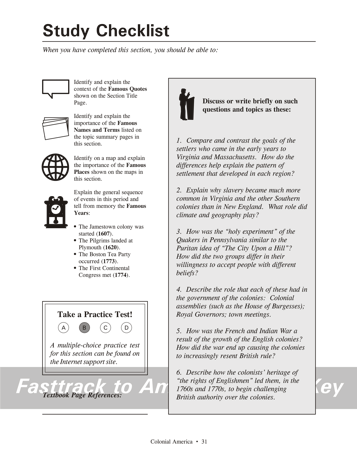| Fasttrack
to America's Past Teacher Key |
|
| Fasttrack
to America's Past Teacher Key |
|
 Page 31 |
Page 31 - Study Checklist Background for the discussion questions 1. Compare and contrast the... Settlers who came to Virginia were motivated mainly by the hope of getting land and gaining wealth. For most people in England, land was very difficult to obtain. The big estates, for example, were usually inherited entirely by the oldest son. A small merchant, tradesman, or laborer usually could not afford to buy even a small farm. In Massachusetts, most of those who came in the early years were motivated by religion. The Pilgrims at Plymouth and the Puritans who followed in large numbers all hoped to create communities guided by religious principles. Land, of course, was also important to the settlers in Massachusetts. But the geographic pattern of their settlements points to the central role of religion. They gathered in towns centered on the meeting house, or church. Their fields were arranged just outside the town. The pattern of settlement in Virginia was different. Large farms called plantations spread along the shores of the rivers, rather than being grouped around towns. As a result, Virginia had far fewer towns than Massachusetts. 2. Explain why slavery
became... The climate and soil conditions of New England do not support the kind of large "cash crop" plantations that were common in the South. Most farms in the New England states were small, and were operated by a family mainly for their own support. It's important to remember that slavery does not represent free labor to the slave holder. Slaves were expensive to purchase, and required housing, food, and care. Unless the wealth that could be created with slave labor was greater than their expense, holding slaves represented an economic loss. In most cases, farmers in New England states found that using slave labor was more expensive that alternative choices, such as hired labor or indentured servants. 3. How was the "holy experiment" of... Both the Quakers and the Puritans were
religious groups
with a strong desire to create a better, more compassionate
society.
The Puritan minister John Winthrop speaks (on page 41) of building a
community in which everyone works together for the common good in a
spirit
of love and sharing. 4. Describe the role that each... Colonial assemblies (such as the House of
Burgesses in
Virginia) were the elected law-making bodies in the colonies.
They
did not have the wide powers that state legislatures have today,
of course. Over the colonial assemblies would typically be an
appointed
royal governor and his appointed council of advisors. Higher up
the
ladder was the British Parliament, and of course, the King or
Queen. 5. How was the French and Indian War... As the English
colonies grew during
the 1600s and 1700s, the line of settlement moved steadily
westward.
By 1750, some colonists were moving over the Appalachian
Mountains.
That area was also claimed by the French. Fighting over control
of
the territory just west of the Appalachians developed into the French
and
Indian War. 6. Describe how the
colonists' heritage... England had also developed vitally important ideas such as the rule of law, and recognized certain basic rights of individuals. These included, for example, the right to a jury trial for those accused of breaking a law, and the right of elected representatives to approve any taxes. In the 1760s and early 1770s, most American colonists considered themselves loyal British subjects. They increasingly resented attempts by King George III and the British Parliament to tighten control over the colonies, however. Laws like the Stamp Act and Tea Act - which were never approved by elected assemblies in the colonies - deeply alarmed the colonists. The colonists feared that they were being turned into second-class citizens who did not have the same rights as the English people back in England. Many decided that they would rather fight than risk that possibility. |
|
Copyright Notice
Copyright 2018 by David Burns. All rights reserved. Illustrations and reading selections appearing in this work are taken from sources in the public domain and from private collections used by permission. Sources include: the Dover Pictorial Archive, the Library of Congress, The National Archives, The Hart Publishing Co., Corel Corporation and its licensors, Nova Development Corporation and its licensors, and others. Maps were created or adapted by the author using reference maps from the United States Geological Survey and Cartesia Software. Please see the home page for this title for more information. |